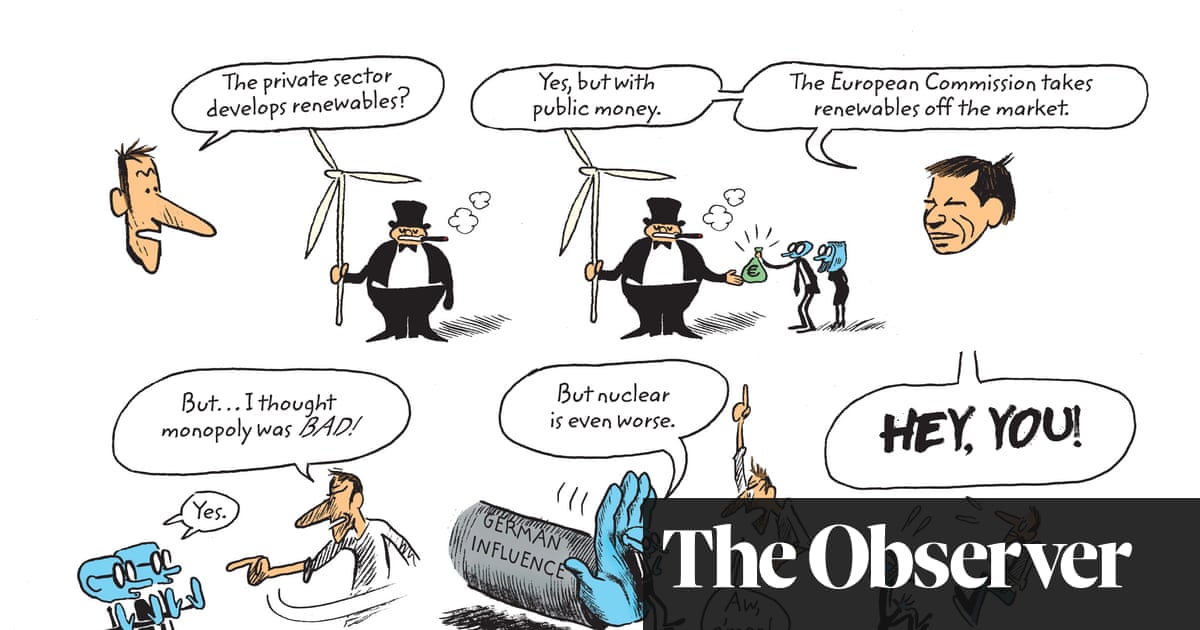When someone told me that World Without End by Jean-Marc Jancovici and Christophe Blain outsold Asterix when it was published in France in 2021, I was sceptical to put it mildly. If I know how attached the French are to their beloved bandes dessinées, I also know how much they love their brie and beef bourguignon; it seemed a bit unlikely they would take to their hearts a book whose alternative title might be: Everything You Always Wanted to Know About Climate Change But Were Too Afraid to Ask.
But there it is. The title was indeed a word-of-mouth sensation, and now it has been translated into English (by Edward Gauvin) ahead of publication in the UK and the US, where the Pulitzer prize-winning author of The Sixth Extinction, Elizabeth Kolbert, has already asked, only half jokingly, if it might not save the planet. So what’s its secret? In the end, I think, it’s that Jancovici and Blain come at their subject with such a lack of dogmatism. In many respects, their message is extremely bleak: if, for instance, average temperatures rose by 4C compared with today (we’ve already had such increases during heatwaves), people born today could find themselves in a place where it would be impossible to survive outdoors before their lifespan is up. But Jancovici, in particular, is determined to remain hopeful and realistic. Eat your cheese, he says. Enjoy your (rare) burgers. But let these things be treats, not the stuff of every dejeuner.
In 2018, Blain, an award-winning cartoonist, was beginning to feel anxious. For a long time global warming had seemed an abstract concept, but now, sweating in his little hatchback on his way to the Breton coast, he felt he could ignore it no longer. What to do? On the urging of his brother, who told him to take action rather than just to mope, he set up a meeting with Jancovici, a science communicator with an engineering background who in the early 00s had developed a protocol that gave rise to the global standard for measuring greenhouse emissions. World Without End is the result of the collaboration on which they eventually embarked, Jancovici having provided the facts and clever concepts, and Blain the angst, the jokes and the occasional superhero (energy provides human beings with any number of special powers, from flying to communicating with fellow members of the species on the other side of the world).
It isn’t, be warned, an easy read. The detail is astonishing. I now know an awful lot about service economies and their effect (bad) on what Jancovici calls “energy sobriety” (I should write to Ed Miliband or Rachel Reeves). But you’ll feel better for having ploughed through it. Every aspect of your life, from your socks to your toothbrush, will have new value now you know just what these things cost the planet.
That toothbrush. The blue gel you squeeze on it contains Sorbitol, which comes from a starch factory to which trainloads of corn are brought every day. The tube in which the gel is kept is plastic, the manufacture of which involves an oil platform, a refinery and an extruder to shape it. Did you look in the mirror as you brushed? Don’t even get me started on mirrors, all that copper and silver and glass… The list goes on. Positively encyclopedic in its outlook, this is a book that takes you back, in a good way, to childhood, every dilemma, decision or future scenario carefully illustrated with a memory-boosting little picture. I agree wholeheartedly with our friends across the Channel. This is vital reading: every maison should have one.
